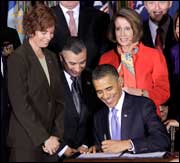Dunning celebrates persistence in repeal of DADT
Zoe Dunning, a retired Navy commander and Unitarian Universalist, stood by President Obama’s side as “Don’t Ask, Don’t Tell” was repealed.
Dunning’s path to that stage took 17 years. It began when she publicly outed herself as a lesbian in 1993 in support of Keith Meinhold, a naval officer discharged from the Navy for being gay. After her announcement, the Navy began procedures to discharge her, a process that lasted two-and-a-half years.
Dunning, however, was able to mount a successful defense by saying that her sexual orientation did not prove her intent to engage in homosexual activity. In other words, her lesbianism was a status, rather than a conduct. It was a strategy that worked—once. The Department of Defense General Council then issued a memo banning the use of this argument. She was the only openly gay person serving in the military for 13 years until her retirement in 2007.
Ironically, while Dunning was engaged in the discharge fight, she was also earning commendations and promotions.
Being a Unitarian Universalist provided Dunning with important support during the lengthy battle for repeal. Born and raised as a Presbyterian and Congregationalist, she first started attending a UU church in 1987 in Pensacola, Fla. “It was very southern, very Republican, and very traditional there, and I was a lesbian in the Navy. I was looking for a community outside of the Navy where I could be myself. When I went to the local UU congregation in Pensacola, I really found a home, a place where I could meet like-minded folks who shared my values.”
Even though she hadn’t come out to the congregation, she felt comfortable being in a community that would accept her if she did, she said.
Dunning was a member of the UU Church of Palo Alto, Calif., when she did come out in 1993. “I found that I couldn’t live a lie anymore,” she said. “I was tired of watching others having to live a lie and be dishonest about who they were.”
UUs have long supported equal rights for gay, lesbian, bisexual, and transgender people. In 1993, the General Assembly of the Unitarian Universalist Association supported lifting the ban on homosexuals in the military. In 2007, General Assembly called for the repeal of “Don’t Ask, Don’t Tell.”
Dunning became an activist for the repeal of the “Don’t Ask, Don’t Tell” law, which was implemented in 1993 during the Clinton administration. She served from 1993 to 2000 on the board of Servicemembers Legal Defense Network, an organization dedicated to bringing an end to DADT and providing support for those affected by the law, serving as its co-chair from 1993 to 1998. She rejoined the board in 2005 and has been board co-chair since October 2006.
“One of the messages I want to share with you today is the power of persistence,” Dunning said in a sermon delivered January 2, 2011, at the Berkeley church. “One of the reasons I was selected [to be on that stage] was because I’ve been working on this for 17 years—through eight years of an administration that wasn’t very friendly, through many hateful hearings, through many bad times and good times. I knew in the end we were on the right side of justice, and so I kept plugging.”
Dunning told UU World that she knew things were going their way when she heard Adm. Mike Mullen, the chairman of the Joint Chiefs of Staff, testify before the Senate Armed Services Committee on behalf of lifting the ban. “He didn’t use typical utilitarian arguments about readiness or cost or other practical matters,” she said. “He talked about it being an issue of integrity, that we as an institution state that our values are honor, courage, and commitment, yet we ask a whole subset of service members to lie about who they are. It was about the integrity of the institution as well as the integrity of the individual.” It left Dunning in tears.
She credited two other Unitarian Universalists, retired Rear Adm. Jamie Barnett and retired Navy Capt. Joan Darrah, with helping to persuade Mullen to support the repeal.
UUs, Dunning said, are inspired by a moral vision in their social activism. “It’s always been our guiding light,” she said. “When we engage in social activism, we look at the morality of the law or the institution or the situation. We look at what is the right thing; what is the compassionate thing; what is the just thing.”
What was it like standing next to President Obama as he signed this historic piece of legislation? “The energy in the room was electric,” she said. “The auditorium was filled with three or four hundred people who had been working on this issue for many years. But the biggest benefit was to have the opportunity to look out into the auditorium and see the faces of joy, the tears of joy, and see the healing going on in the room.”
Although DADT has been repealed, the fight is not over, Dunning says. “We don’t have full equality until our transgender brothers and sisters have the opportunity to serve as well.” But she’s thinking of continuing the fight in a different way, by running for office. “After all these years of trying to influence decision makers and trying to get people who are in elected office to see things our way, I’m investigating what it would be like to be an elected official.”
See sidebar for links to related resources.








